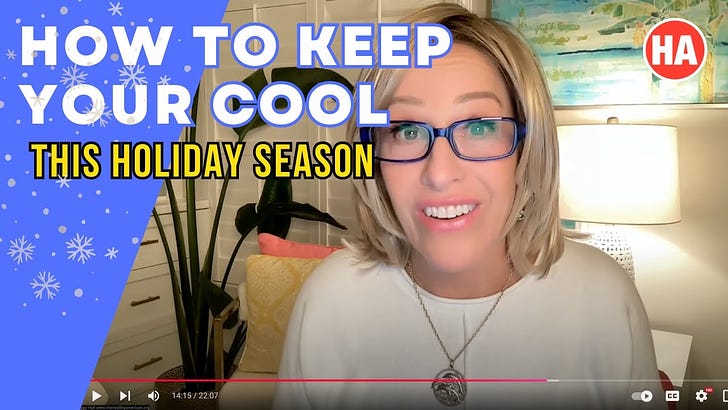How to SPEAK Your MIND without LOSING your MIND! 🤯
How to keep your cool this holiday season while everyone else around you is losing theirs!
Ah, the holidays—a time of joy, connection, and let’s be real, a touch of chaos. Whether it’s Thanksgiving, Hanukkah, Christmas, New Year’s, or any other festive gathering, the season brings together people we may not see often. While these reunions can be heartwarming, they can also be emotionally charged.
So, how do you stay cool when everyone around you seems to be on edge? How do you speak your truth without sparking a holiday showdown? Let me walk you through some tried-and-true strategies to navigate these tricky waters with grace, calm, and—dare I say—a bit of cleverness.
Your Worth ≠ Winning Arguments
First things first: your opinions and values are not a measure of your worth. Repeat that like a mantra if needed. You don’t have to convince anyone or “win” an argument to feel validated. In fact, the holidays are the perfect time to practice a powerful communication tool: listening.
Yes, I said it—listening.
While you might be tempted to launch into a passionate defense of your beliefs, sometimes the most impactful thing you can do is let others talk themselves out.
Winning a conversation doesn’t come from talking the most; it comes from listening the best. I know it sounds counterintuitive, especially if you’re someone (like me) who loves sharing your perspective. But let’s face it—trying to convince someone that you’re right rarely works. Most people don’t want to admit they’re wrong and they want to find these answers on their own.
Instead, flip the script. Become the listener. By letting others share their thoughts, you not only keep the peace, but you also gather all the information you need—should you choose to respond later.
Here’s the magic formula:
Ask questions: Start with open-ended phrases like:
“Tell me more about that.”
“I see, go on.”
“That’s interesting—what else?”
Stay calm and neutral: Respond with phrases like:
“I see where you’re coming from.”
“I hadn’t seen it that way before.”
“That’s an interesting perspective.”
You’re not agreeing with them—you’re just keeping the peace. For example, let’s say someone at the table starts gushing about the city’s new bike lanes, and you’re itching to counter their argument. Instead of diving in with your (valid) points, try this:
"Oh, I see! Tell me more about why you like the bike lanes."
By giving them the floor, you not only diffuse tension but might also notice them walking themselves into logical traps. Maybe they’ll realize on their own that fewer car lanes actually means more congestion.
When the other person has finally exhausted their monologue, take it up a notch with strategic questions like:
"I’m curious—how did you come to that conclusion?"
"I’d love to hear more about what led you to that perspective."
Think of questions like those that encourage them to dig deeper and boom! You’ve just invited them to reflect on their stance. Often, people realize their argument has holes on their own—no debate required. It’s not about catching them in a trap but allowing them to critically examine their own stance. And if they’re open-minded, they might even shift their view.
Once you’ve heard them out, repeat back their key points. For example:
"So, if I understand correctly, you believe bike lanes are more inclusive and help the environment, which in turn improves the city’s overall aesthetic. Is that right?"
This not only shows you’ve been listening but also builds rapport. People love feeling understood. From here, ask if they’re open to hearing your thoughts:
"Would you like to hear my perspective on this?"
If they’re open to it, you’ve created a space for genuine dialogue. If not? Well, you’ve saved yourself the energy of a one-sided debate. Either way, you’re staying calm and in control.
These strategies aren’t just about winning conversations—they’re about keeping your cool when everyone else is losing theirs.
I’d love to hear your thoughts on how these approaches resonate with you. Ideally, the people you’re engaging with are rational, level-headed, and emotionally mature—ready to have a healthy, open dialogue. In that kind of setting, you can freely share your perspective, and everyone benefits from a meaningful exchange of ideas.
In my experience, some people may resist these dialogues because of insecurity, fear, or simply an aversion to having their beliefs challenged. And while it’s tempting to think you might sway their opinions on topics like health, politics, or religion, the real value lies in fostering open exchanges and showing the maturity to engage respectfully.
As we head into the holiday season, I hope these tips and phrases equip you to navigate tough conversations with grace and confidence. Let me know how it goes—I always enjoy hearing your experiences.






This is pure gold! thanks Peggy for shining the light of truth and compassion into our world!
Ruyard Kipling from the poem "If" for interested parties.
The person asking the best questions gets the best answers.
Peggy is teaching the skill.
Post Thanksgiving will be interesting as some share...
Some of us do not gather around a dead bird to give thanks.